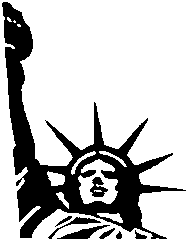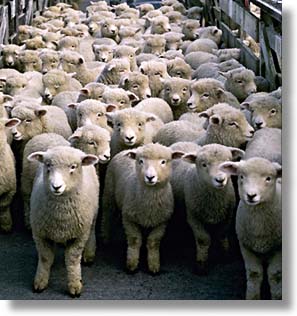| Montréal,
le 11 avril 1998 |
Numéro
6
|
 (page 2)
(page 2)
 page précédente
page précédente
Vos
commentaires

Publié sur la Toile depuis le 21
février 1998
DIRECTEUR
Martin
Masse
ÉDITEUR
Gilles
Guénette
RECHERCHISTE
Claire
Joly
CHRONIQUEURS
Pierre
Desrochers
Pierre
Lemieux
Brigitte
Pellerin
COLLABORATEUR
Ralph Maddocks
LE
QUÉBÉCOIS LIBRE défend la liberté individuelle,
l'économie de marché et la coopération spontanée
comme fondement des relations sociales.
Il s'oppose
à l'interventionnisme étatique et aux idéologies collectivistes,
de gauche comme de droite, qui visent à enrégimenter les
individus.
Les articles publiés
partagent cette philosophie générale mais les opinions spécifiques
qui y sont exprimées sont la responsabilité de leurs auteurs.

NOTRE PHILOSOPHIE
ARCHIVES
LIENS LIBERTARIENS
LA PAGE DU DIRECTEUR
POUR NOUS REJOINDRE
|
|
EDITORIAL
GUY
BOUTHILLIER AND THE FRENCH MEDIA'S SILENCE
by Martin Masse
Our readers who rely only on the francophone media to stay well-informed
will probably wonder why they haven't heard anything about this Bouthillier
affair, while we devote two articles to it this week after having reported
on it already last week. The reaction of the
francophone press to this story has indeed been nearly unanimous: let's
keep our mouths shut.
To our knowledge, besides Le Québécois Libre, only
a few commentators have given an account of and denounced what the president
of the SSJMB said: Jean Lapierre at CKAC; Jean Paré, the publisher
of L'Actualité, on radio; Michel David in a Le Soleil
column; and Michel Venne in a Le Devoir editorial. Gilles Proulx
also interviewed Bouthillier but, with his usual judiciousness, only to
congratulate him for his courageous statements.
La Presse only published a little article two days later on Alliance
Quebec's denounciations. Which is of course the best way to trivialize
the story and show it as only another episode of Anglos-whining-for-no-reason,
when it's Quebec's democracy that is being attacked, a matter that should
concern everybody.
Only a few mentions, thus, that can be counted on the fingers of both hands.
Apart from that, no actual report on the event itself, either on TV, radio
or in newspapers, no demands for clarifications, no accounts of reactions
to it. Nothing. That's it.
An extraordinary media phenomenon
You really need to stop a few seconds to realize to what extent this is
an extraordinary media phenomenon. In a society where language issues are
being endlessly debated, where the slightest declaration by an eccentric
writer who only represents himself — namely Mordecai Richler — brings headlines
everywhere the next day, this story was not deemed worth a few minutes
of attention in dozens of newsrooms in the province. Even though — and
this needs be repeated — this man heads an organization in charge of the
important festivities for the so-called Fête nationale in Montreal,
an organization which has thus officially received the mandate from the
government to bring together all Quebeckers.
Criticism is frequently being aired, in the rest of the country, about
the biases that characterize how nationalism and unity issues are being
reported on in the francophone press. Each time, some columnist or editorialist
jumps on his high horse to declare that Quebec has no lesson to receive
from anybody. But this is nevertheless another striking example of such
partiality. How can we explain it?
1) Some journalists are simply in agreement with the xenophobic statements
made by Bouthillier, or at least are hostile enough towards anglophones
to excuse them.
For example, Le Québécois Libre sent a press release
last week to all the main media outlets in Quebec, with our editorial denouncing
the SSJBM's position. One striking reaction, that of Pierre April of the
Presse canadienne in Quebec City, who left a message on our phone machine
asking that we do not send him more of « that kind of
literature », with an intonation that clearly meant
« that kind of extremist garbage ».
What does Mr. April really think of this story? For him as well as for
other journalists, Bouthillier may still be a respectable spokesman, even
if his words went a bit further than his thoughts. It is rather those who
denounce him who should be condemned.
2) In the little nationalo-statist intellectual circles of Quebec, everybody
has friends, family members or colleagues who have invested a lot during
the past decades fighting for « l'option », winning
conditions or not. One would cause them chagrin by helping to propagate
negative stories. An emotional pressure inevitably builds up.
Better play it safe, not report that kind of bad news while hoping to stay
free of remorse as it pertains to your journalistic ethic, and get on with
the business of calling Anglo militants « extremists »
on every occasion. Since Anglos don't watch our programs, nobody will complain
and my sister-in-law who is a PQ member will be very happy.
|
One can only notice, for example, that Pierre Bruneau at TVA referred to
Messrs. Richler, Galganov and Henderson as extremists, with an indignant
face that he seldom puts on, as he interviewed Culture minister Louise
Beaudoin concerning the 60 Minutes document about the language police.
Mr. Bruneau and his newsroom team, however, did not see fit to interview
one of their anglophone compatriots to wax indignant following the remarks
of the extremist Bouthillier.
3) One last reason which reinforces the first two, is that we must do whatever
is possible to keep among us the least-well-kept dirty little secret in
Quebec, that is that there are xenophobes, racists and intolerant people
among the defenders of the nation. To report on and denounce Bouthillier's
comments would imply admitting that all those who, in English Canada and
the U.S.A, pretend that Quebec nationalism is an essentially ethnocentric
movement with its nut fringe, are right. It would mean feeding those who
wage « smear campaigns » against
Quebec abroad.
It is significant that the four commentators who denounced the SSJBM all
deplored the following consequence: Bouthillier is making a bad name for
nationalism, his comments will justify the worst criticisms about Quebec.
If the rare voices which denounced him seem so preoccuped with this, one
can imagine how worried must be those who did not dare do it! We only need
to observe the hysteria that followed the airing of this document on 60
Minutes to see that this question of Quebec's image abroad touches
a very sensitive nerve.
Furthermore, Guy Bouthillier himself doesn't seem too concerned with this,
which probably allows him to say aloud what he thinks without worrying
about the consequences. Here is how he rejected criticism concerning another
controversial issue, the use of the notwithstanding clause, at the same
hearings (my transl.): « And I know very well that we
are being answered, in circles that you may also associate with, that we
are being told: Be careful, be careful, what are they going to say about
us abroad! (...) Besides, what is exactly this international public opinion?
Does it really exist? It is an international public opinion, or is it not
rather the expression, outside of our frontiers, of an opinion invented
here, fabricated here, built up here by the English Canadians of Montreal,
Toronto or elsewhere? »
Denial of reality
Too many people have invested too much, since the Quiet Revolution and
even more since 1976, in the collectivist image of a French Quebec that
takes charge of itself and imposes itself, to dare question it now. To
reveal the dirty little secret that corrodes our nice and skin-deep «
national » identity would bring a too brutal questioning.
Doubts could even extend to such a sacred cow as bill 101. Unacceptable.
In psychoanalysis, you call that a denial of reality: the refusal to recognize
a fact whose perception would be traumatizing for the subject. Bare a few
exceptions, everybody prefers to stay put and wait until it goes away.
Whence this law of silence that rules over the francophone press.

Le Québec libre des
nationalo-étatistes
|
«
Après avoir pris ainsi tour à tour dans ses puissantes
mains chaque individu, et l'avoir pétri à sa guise, le souverain
étend ses bras sur la société tout entière;
il en couvre la surface d'un réseau de petites règles compliquées,
minutieuses et uniformes, à travers lesquelles les esprits les plus
originaux et les âmes les plus vigoureuses ne sauraient faire jour
pour dépasser la foule; il ne brise pas les volontés, mais
il les amollit, les plie et les dirige; il force rarement d'agir, mais
il s'oppose sans cesse à ce qu'on agisse; il ne détruit point,
il empêche de naître; il ne tyrannise point, il gêne,
il comprime, il énerve, il éteint, il hébète,
et il réduit enfin chaque nation à n'être plus qu'un
troupeau d'animaux timides et industrieux, dont le gouvernement est le
berger. »
Alexis de Tocqueville
DE LA DÉMOCRATIE EN AMÉRIQUE
(1840) |
|

